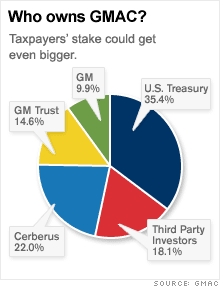Executive pay crackdown is a joke
GMAC is looking for a third bailout. So much for pay cuts helping the Not-So-Magnificent Seven TARP recipients to pay back taxpayers more quickly.


NEW YORK (CNNMoney.com) -- What do you know? The suits at troubled finance firm GMAC must like working for less money. How else to explain that GMAC is reportedly trying to get a third helping of government rescue funds?
GMAC is one of the seven firms that the Obama administration announced sweeping changes in executive compensation for last week.
Kenneth Feinberg, the White House's so-called pay czar, said at the time that restricting executive pay at companies that received "exceptional assistance" from the government would give them more incentive to quickly pay back their bailout loans.
Easier said than done.
GMAC, along with AIG (AIG, Fortune 500), Bank of America (BAC, Fortune 500), Citigroup (C, Fortune 500), Chrysler, Chrysler Financial and GM, Chrysler, must be eager to get out from under Washington's thumb. Until they do, they are going to continue to be subject to more onerous rules on pay than their competitors.
But the reason they all needed "exceptional assistance" from the Troubled Assets Relief Program in the first place is that their business prospects are hardly exceptional.
"GMAC is clearly a debacle. Other companies like Citigroup and Bank of America would probably have disappeared if not for the grace of Uncle Sam," said Barry Ritholtz, CEO and director of equity research at research firm Fusion IQ in New York.
GMAC, which provides financing to car buyers, GM and Chrysler auto dealers and also owns the online bank Ally, continues to struggle mightily. The company reported a net loss of nearly $3.6 billion in the second quarter of this year and has lost a total of $7.65 billion since the beginning of last year. (Privately held GMAC will release its third quarter results on Nov. 4.)
Until GMAC turns itself around, it may need even more government funding to keep it from falling apart. While all of us are sick and tired of bailouts, the Treasury Department has too much skin into GMAC -- not to mention GM and Chrysler --- to stop playing the role of loan shark.
The government owns a more than 35% stake in GMAC. Failure to keep propping it up could not only devastate GMAC but also lead to deeper problems for the auto industry given how much dealers and customers rely on GMAC for borrowing needs. That can't be allowed to happen.
It may have been one thing for regulators to finally draw a line in the sand a few months ago and tell small business lender CIT Group (CIT, Fortune 500) that it wasn't going to receive any more TARP largesse. Leaving Carl Icahn and other bondholders to haggle over the fate of CIT makes sense.
If CIT goes bankrupt, so be it. It would hurt but it would not qualify as an event that would jeopardize the health of the overall financial system. The government doesn't have the luxury of being so cavalier with GMAC.
So assuming that GMAC does get another bailout, will it really be in a better position to pay back the government anytime soon? Probably not. And that's most likely true for the other big bailout recipients -- which some have cleverly dubbed the Not-So-Magnificent Seven.
In fact, Treasury Secretary Tim Geithner said Tuesday at a securities industry conference in New York that it will be some time before either GM or Chrysler are in a position to pay back their TARP loans.
What's more, Citi and BofA both reported losses in the third quarter and analysts expect them to remain in the red for the fourth quarter. And even though these banks have raised more capital, why should Treasury allow them to return TARP funds just yet?
Neither company is in a strong position as say, JPMorgan Chase (JPM, Fortune 500), which paid back its $25 billion bailout loan this summer. Heck, Wells Fargo (WFC, Fortune 500) just reported record profits and the government still hasn't permitted it to pay back its $25 billion TARP loan.
Don't get me wrong. I'm all for taking steps to make sure that financial firms don't make the same mistakes they did in the past. And it's hard to justify the big paydays for most C-level executives and traders.
It's good news that Washington is trying to encourage troubled firms to pay back TARP loans more quickly. But it's comical to think that the crackdown on pay is going to help the Not-So-Magnificent-Seven return to health anytime soon. There has to be a better way.
"You need to give the government some control over these firms as a condition for giving them taxpayer money. But the real objective for regulators should be to turn these firms around," said Joseph Mason, a professor at finance at Louisiana State University. "If you want to replace executives, just replace the executives. Don't go around mucking with their pay."
Instead, the government may be simply forcing companies to slash salaries and bonuses in the name of protecting taxpayers -- while having to go out and lend these same companies more taxpayer money.
Talkback: Will the compensation crackdown on seven big bailout recipients help or hurt these companies? And should the government have any say on executive pay? Share your comments below. ![]()

